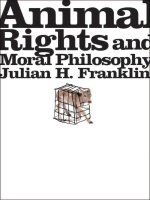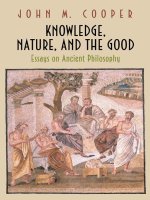columbia university press animal rights and moral philosophy dec 2006
Bạn đang xem bản rút gọn của tài liệu. Xem và tải ngay bản đầy đủ của tài liệu tại đây (809.17 KB, 177 trang )
Animal Rights and Moral Philosophy
Animal Rights and
Moral Philosophy
Julian H. Franklin
Columbia University Press • New York
Columbia University Press
Publishers Since 1893
New York Chichester, West Sussex
Copyright © 2005 Columbia University Press
All rights reserved
Library of Congress Cataloging-in-Publication Data
Franklin, Julian H.
Animal rights and moral philosophy / Julian H. Franklin
p. cm.
Includes bibliographical references and index.
ISBN 0–231–13422–3 (cloth : alk. paper)
ISBN 0–231–50871–9 (E-book)
1. Animal rights—Moral and ethical aspects.
I. Title.
HV4708.F74
179'.3—dc22
2005
2004055121
Columbia University Press books are printed on
permanent and durable acid-free paper.
Printed in the United States of America
Designed by Lisa Hamm
c 10 9 8 7 6 5 4 3 2 1
In memory of Marty Fleisher
But for the sake of some little mouthful of
flesh we deprive a soul of the sun and light,
and of that proportion of life and time it had
been born into the world to enjoy.
—Plutarch, Moralia, “The Eating of Animal Flesh,” 1.4
Contents
Preface
xi
Acknowledgments
xvii
1
Peter Singer and Utilitarianism
1
2
Regan on Animal Rights
13
3
Animal Rights and Kant
31
4
Animal Rights and Post-Kantian Rationalism
53
5
Animal Rights and Compassion
77
Contents
6
Conflict of Rights and Environmentalism
89
Appendix 1
Animal Consciousness
115
Appendix 2
Biomedical Testing and Use of Animals
125
Notes
129
Bibliography
139
Index
145
x
Preface
My purpose in this book is to rework the theory of
animal rights and suggest some new directions. By
animal rights I do not mean a utilitarian theory of
animal liberation in Peter Singer’s sense. Despite the
great debt we owe to Singer for inspiring the modern
movement for animal rights, I believe his case for
respecting animal interests is theoretically inadequate. Singer’s argument for animal liberation is
founded on utilitarianism, which fails as moral philosophy. In the opening chapter of this volume, I
shall restate the standard critique of that position,
and I shall also try to show that there are several
important issues on which Singer cannot give nonhuman animals1 the consideration they deserve.
There are of course a number of utilitarians, or
theorists influenced by the utilitarian position, who
have contributed thoughtful pieces along the lines
laid down by Singer. But it is no part of my project in
this book to provide a history of doctrines or even to
supply an outline of that history in recent times. I
have concentrated on Singer because he best represents the central tenets and applications of the position. I shall also deal with R.G. Frey as one utilitarian
who is diametrically opposed to granting moral consideration to animals. A position like Frey’s is rare
Preface
among utilitarians. But his position is worth considering briefly, if
only to show that utilitarianism cannot be pressed into the service of
a “case against animals.” The utilitarian doctrine is inexpugnably
egalitarian in its fundamental outlook, and while Singer’s argument
is flawed, in my opinion, I will try to show that Frey’s is incoherent.
As things now stand, the best argument for giving full respect to
animals is The Case for Animal Rights by Tom Regan. The criterion of
moral action here is not, as with Singer, an aggregate of pleasure or
pain in which the individuals who make up that aggregate are mere
receptacles of units of utility. For Regan, all mammals of a year or
more in age have an inherent prima facie right to life and liberty.
This is the main thesis of a powerful and sympathetic case for animal
rights, and I shall consider it at length in chapter 2. As might be
expected, there are a number of theorists who have adopted a similar approach, but once again I shall concentrate on Regan as the
prime exemplar.
For all its virtues, the rights argument, as it is commonly understood, is incomplete. The system of reflective intuitions that lead to
equal rights for animals is consistent, and in my opinion airtight.
Those who criticize Regan for relying so much on intuition fail to
consider adequately the imposing chain of his reflections. The real
problem is rather that this superstructure lacks a solid base. Regan
assumes, as universally granted, that animals cannot be treated “in
just any way.” This is a crucial assumption, but Regan does not
attempt to justify it.
In chapter 3, I shall try to find a foundation for that judgment in
Kant’s categorical imperative. Kant, of course, is notoriously dismissive of rights for animals. He presents the categorical imperative
as though it covers rational beings only. Taking Kant at his word,
theorists of animal rights regularly pass his moral doctrine by. But
this is a costly mistake. Kant confuses the subjects of the categorical
imperative, which are and must be rational beings, with the objects
to which the categorical imperative applies. I will try to diagnose this
confusion, and after dealing with all three forms of Kant’s categorical imperative, I will venture to conclude that their basic moral principle is properly rendered by the categorical imperative in a revised
xii
Preface
version of its second form. It should now be taken as though it reads
as follows: Act in such a way that you always treat sentience, whether
in yourself or in the self of any other, never simply as a means but also
at the same time as an end.
Chapter 3 will also examine Evelyn B. Pluhar’s alternative form of
rationalist morality. Pluhar dismisses Kant. But she believes that a
theory of animal rights can be derived from the rationalist ethic of
Alan Gewirth. Although her effort is noble and ingenious, I will
argue that it too is insufficient. It wholly depends on Gewirth’s
rationalist ethics, which will be criticized as unsustainable.
In chapter 4 I shall consider some of the best known attempts to
preserve a Kantian viewpoint without directly relying on his moral
theory. Rawls and Habermas, each in his own way, do not begin with
an analysis of rationality as such. Instead, they presuppose a community of humans and ask for the rules of justice or morality that it
will adopt under constraints requiring all of its members to respond
reasonably to questions of justice and morality. These theories
ignore the rights of animals more or less completely, and I shall try
to show in chapter 4 that they do so only at the price of inner consistency. Here I will go back very briefly into history to show that my
objections to Rawls and Habermas are adumbrated in Diderot’s
reflections on the idea of a general will. I will then end this chapter
with a brief critique of the contractarian efforts of Jan Narveson and
Peter Carruthers.
Chapter 5 deals with attempts to develop a theory of respect for
animals from human feelings of compassion. These are moving
efforts, and compassion can surely evoke and supplement the moral
imperative derived from reason. But compassion, I believe, cannot
stand alone as an independent basis of equal respect for animals.
Without a foundation in reason it will always lack a proper basis of
discrimination. I shall try to show this by a critique of two very
prominent positions of this sort: Albert Schweitzer’s “ethic of reverence for life” and the feminist, or ecofeminist, “ethic of care.” At
the end of the chapter, there are some very brief remarks in which
I question whether equal respect for animals can be reached by
appealing to religion.
xiii
Preface
The last chapter, on environmentalism and animal rights, seems
to be a change of topic. But the use of nature is the main area in which
human and animal rights conflict. By a conflict of rights, I mean situations wherein the legitimate interests of animals and the legitimate
interests of humans directly clash. The eating of meat is not a clash
between the animal and the human right to nourishment, since the
animal is used as a mere instrument for human satisfactions. The
same applies to the use of animals for biomedical experiments. This
is not a conflict of otherwise legitimate interests. Animals alone are
made to sacrifice; they do not give consent.
On the other hand, competition between humans and animals for
the use of a particular natural resource is an authentic conflict of
otherwise legitimate interests. This poses a dilemma to which I
believe a reasonable solution can be found. The advocates of animal
rights and hard-core ecologists are too often driven to extremes.
Tom Regan and J. Baird Callicott are prime examples of this. I shall
argue instead for a middle position. Humans have priority over animals, but only with an important limitation. Any new or more
intense appropriation of nature must be justified by a clear showing
that the general quality of human life will be advanced thereby and
that no reasonable alternative exists.
I have also included an appendix on animal consciousness. Proponents of animal rights, somewhere in their discussion of the main
issues, point out that Descartes and his modern heirs are mistaken
in their claims that animals lack awareness and so do not feel pain,
but I have not done so in the body of the text. Cartesianism in its
modern form is so diametrically opposed to common sense, is so
weak a case, and is so clearly entertained only by hard-core opponents of animal rights, that I have decided not to dignify it by inclusion as a chapter. After a brief comment on Descartes and his early
followers, I shall take up, and I hope effectively refute, four representatives of modern neo-Cartesianism.
Except for the foray into environmentalism, I do not comment on
questions of public policy. I try to focus solely on moral philosophy.
Nevertheless, I feel bound to say something about the use of animals
for biomedical experimentation. If the argument for animal rights is
xiv
Preface
correct, this practice must be wrong. Yet many educated laymen,
considering animal rights more or less for the first time, are appalled
by this particular implication. I thus feel obliged to state, however
briefly, how I stand on this issue. Since this is not properly within my
topic, I will include my thoughts in a second brief appendix.
xv
Acknowledgments
This book is philosophical. I plan to deal with certain
major issues of moral philosophy as they apply to concern for animals. I have tried to arrive at a persuasive
theory of animal rights, by which I mean the right of
animals to be treated equally with humans so far as
their interests are relevant. Animals obviously cannot
have a right of free speech or a right to vote because
they lack the relevant capacities. But their right to life
and to be free of exploitation is no less fundamental
than the corresponding right of humans.
My exploration of these questions comes late in my
career. My academic specialty is the history of political thought, within which I have specialized in theories of absolutism and constitutionalism in the sixteenth and seventeenth centuries. But I have always
had a very deep concern for animals and great revulsion for the ruthless ways in which they are exploited.
I have long contributed to animal causes, and I have
been a vegetarian (with vegan aspirations) for the last
twenty years. After retiring from full-time teaching
in 1996, I gradually became more active in behalf of
animal rights. After a few years of searching, I settled
on teaching and writing on animal issues.
I don’t expect that many readers will be converted
to the cause of animal rights by reading this book.
Acknowledgments
Indeed, the ability of intelligent and educated people to avoid confronting the issue, or to offer endless evasions and rationalizations
of delay on a question as straightforward as vegetarianism, even
when they have heard and (reluctantly) accepted the argument in
favor, is astonishing as well as depressing. If they are to be swayed,
the change is likely to come from witnessing the realities of the fate
endured by animals. I have not reviewed these horrors here, because
so many powerful accounts exist. Nor have I dealt with advances in
the legal protection of animals both in practice and in theory. I have
focused exclusively on moral theory.
Nevertheless, I believe that a good theoretical argument is worth
the effort. It can reassure the committed, help the uncertain to
decide, and arm the debater. There is a vital long-term benefit as
well. If the idea of animal rights continues to be recognized intellectually, and if it grows in acceptance as a classroom subject, a good
theory will help to solidify a cultural change toward greater concern
for animals—a change that is already under way. I hope that this book
will help this cause along.
The idea for a book on animal rights goes back to an undergraduate colloquium I gave at Columbia in the spring of 1999. But the central thought was shaped by a graduate course I taught at Rutgers
University-Newark in the fall of 2000. I wish to thank Professor
Mary Segers of Rutgers-Newark for arranging the invitation, and
Professor Elizabeth Hull, who sat in on most of our meetings and
whose support was invaluable. At the early stages of this work, discussions of Kant with Thomas Pogge played a vital role in clarifying
my thought. And I was greatly encouraged to push on by Eileen Sullivan’s thoughtful comments on that early set of reflections.
Cynthia Bowman, George Klosko, and Guenter Lewy helped me
greatly by their critical reading and helpful comments on the full
first draft. At various times I also got advice and encouragement
from Robert Amdur, Abraham Ascher, Karen DeCrow, Solomon
Goldstein, Istvan Hont, Francine Klagsbrun, Alex Kolben, and
Frank Lovett. And I received a number of useful suggestions from
the readers for Columbia University Press.
It was truly good fortune to have Wendy Lochner as my editor. She
xviii
Acknowledgments
is the Senior Executive Editor for Religion, Philosophy, and Anthropology at the Columbia University Press, and she was thoroughly
supportive and thoughtful throughout the complicated process that
publishing a book requires.
Another piece of good fortune is that my wife, Paula, who is herself a retired book editor, did heroic service in editing the entire
final draft before I turned it in. Not only was her copyediting superb,
but she raised shrewd and helpful questions on points of substance.
She also took over, unobtrusively, many of my usual household
chores during the final dash to finishing.
xix
Animal Rights and Moral Philosophy
1
Peter Singer
and Utilitarianism
The idea that humans have at least some obligations
to animals is very old. To varying degrees, it is found
in totemist taboos and ceremonies, in all developed
religions of the West as well as of the East, and among
notable philosophers of classical antiquity, including
Pythagoras, Theophrastus, Plutarch, and Porphyry.
Most of these doctrines are incomplete in that they
do not deal with all the issues that would now be taken
up in considering animal rights.
Some, like the Hebrew Bible’s, concentrate solely
on cruelty to animals, while permitting the consumption of animal flesh and requiring animal sacrifice;
others, like Plutarch’s and Porphyry’s, deal mostly
with vegetarianism and temple sacrifices. None of
them, however, not even the classical philosophers,
systematically develop the obligations of humans to
animals from philosophical foundations. That deficiency is only now beginning to be rectified.
In modern times there are two mainstream positions in which the idea that animals are entitled to
equal respect with humans is systematically and
more or less comprehensively developed.
One of these is that of Peter Singer, who is the
leading exponent of utilitarianism as it applies to
respect for animals. I shall begin with Singer because
Peter Singer and Utilitarianism
it is his book Animal Liberation that initiated the modern movement. Animal liberation, or animal rights, go beyond animal welfare
and humanitarianism in its usual form.1 Showing kindness to animals and protecting them from cruelty are good, but no longer
enough. The revolutionary point in the idea of animal liberation is
that animal interests must be accorded the same respect as that
given to humans.
In its simplest form, utilitarianism holds that pain is the only evil
and pleasure the only good, and that the test of whether an act is
moral is whether its consequences, when all the pains and pleasures
that the act causes to those affected by it are calculated and added up,
produce the greatest aggregate of well-being or happiness as compared to any other course of action. Once we admit that all sentient
beings can suffer pain and feel pleasure, they too must included in
the reckoning. If animals no less than humans feel sensations, their
pains and pleasures no less than ours must count.2 That surely was
the opinion of the founder of modern utilitarianism. “The day may
come,” says Jeremy Bentham,
when the rest of the animal creation may acquire those rights which
could never have been withholden from them but by the hand of
tyranny. The French have already discovered that the blackness of the
skin is no reason why a human being should be abandoned without
redress to the caprice of a tormentor. It may come one day to be recognized, that the number of legs, the villosity of the skin, or the termination of the os sacrum, are reasons equally insufficient for abandoning a sensitive being to the same fate. What else is it that should
trace the insuperable line? Is it the faculty of reason, or, perhaps, the
faculty of discourse? But a full-grown horse or dog is beyond comparison a more rational, as well as a more conversable, animal, than an
infant of a day, or a week, or even a month, old. But suppose the case
were otherwise, what would it avail? the question is not, Can they reason? nor, Can they talk? but, Can they suffer?3
Bentham never followed this principle to its logical conclusion.
He did not, for example, rule out the eating of animal flesh entirely,
2









